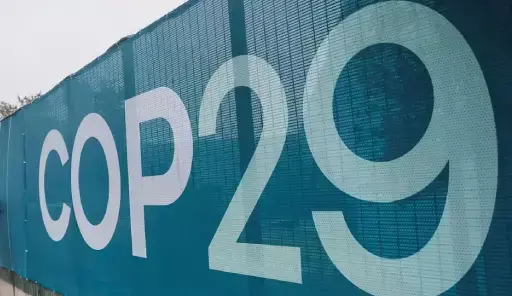Live
- “Telangana Ready to Support AI Technologies That Drive Social Impact,” says Special Chief Secy, Jayesh Ranjan at Woxsen University’s Future Tech Summit 2024
- Hero Motosports Team Rally Announces Squad For Dakar Rally 2025
- Two Men Found Dead In Parked Caravan In Kerala
- Mandhana moves closer to top spot in ODI, T20I rankings
- IND vs AUS Boxing Day Test 2024: Sam Konstas Debuts, Travis Head’s Fitness in Question
- Congress Challenges Election Rule Amendments In Supreme Court
- Jaishankar’s US Visit: Key Diplomatic Engagement Amid Leadership Transition
- Orthodox Church Bishop Criticizes PM Modi’s Christmas Celebration Participation
- Janhvi style & grace takes centre stage
- Allu Arjun’s Pushpa 2 Becomes First Hindi-Dubbed Film to Cross Rs 700 Crore
Just In
India Urges $1.3 Trillion Annual Climate Support for Developing Nations


India Urges $1.3 Trillion Annual Climate Support for Developing Nations
India urges developed nations to commit $1.3 trillion annually in climate finance, emphasizing grants and concessional support for the Global South, free from growth-hindering conditions.
India has demanded industrialized countries invest $1.3 trillion yearly in climate funding till 2030 at the global climate meeting COP29. This need arises in line with the frequency of severe storms, disproportionately harming the Global South.
Representing like-minded developing nations (LMDCs), India underlined the importance of grants, concessional funding, and non-debt-inducing assistance free of growth-inhibiting conditions. Emphasizing the importance of the matter, Naresh Pal Gangwar, Additional Secretary of the Environment Ministry and chief negotiator for India, referred to the summit as "historic" for guiding world climate action.
India's Viewpoint Regarding Climate Funding
Gangwar underlined the need for justice and the fundamental values of the UNFCCC and the Paris Agreement at the High-Level Ministerial on Climate Finance. He underlined the need of affluent countries keeping their historical obligations and offering them unidirectional financial help.
Gangwar said, "We are at a pivotal point in our battle against climate change. The choices taken here will enable countries—especially those in the Global South—to carry out bold mitigating plans and adapt to climate change.
India insisted that the New Collective Quantified Goal (NCQG) on climate financing is still a provision and mobilization requirement for wealthy countries and firmly objected to reinterpreting it as an investment objective.
Climate Finance: Worldwide Accountability
First promised in 2009, India underlined that the $100 billion yearly climate funding target still falls short. Although the Organisation for Economic Co-operation and Development (OECD) says this objective was achieved in 2022, independent estimates—including those by Oxfam—indicate real contributions vary between $27.9 billion to $34.9 billion.
To fulfil their Nationally Determined Contributions (NDCs), developing nations together need $5.8–$5.9 trillion by 2030, according to estimates of the UNFCCC Standing Committee on Finance. India said that as the Global South confronts unmatched difficulties switching to net-zero emissions and mitigating loss and damage caused by climate change, the commitments of the wealthy countries must match these rising demands.
Demand an unambiguous framework.
India underlined the importance of a clear and open definition of climate money in order to build confidence and positive discussions. Lack of a generally agreed upon structure compromises the validity of financial pledges and stunts development.
The Indian delegation said, stressing developed countries to follow their pledges under the Paris Agreement and support increased climate goals, " Transparency and trust are the backbones of any multilateral process."
Increasing the Base of Contributors?
Some affluent countries, notably the US, Canada, and Switzerland, have suggested broadening the contributor base to include high-income, high-emission developing nations as the magnitude of needed expenditure keeps rising. India, however, underlined once again how important past obligations and equality are to conversations about climate funding.
In reference to COP30
India reaffirmed its will to significantly advance global climate action with COP30 approaching, when nations are supposed to submit revised NDCs. It urged rich countries to meet their responsibilities, therefore guaranteeing the Global South sufficient help to fight climate change.
"This marks a turning point. The Ministry of Environment, Forest, and Climate Change stated in a statement that we hope developed nations would rise to the occasion and allow greater aspirations, thereby making COP29 a resounding success.
The path forward for climate financing will define not just the viability of the Paris Agreement but also the survival and prosperity of countries most exposed to the effects of climate change.

© 2024 Hyderabad Media House Limited/The Hans India. All rights reserved. Powered by hocalwire.com






